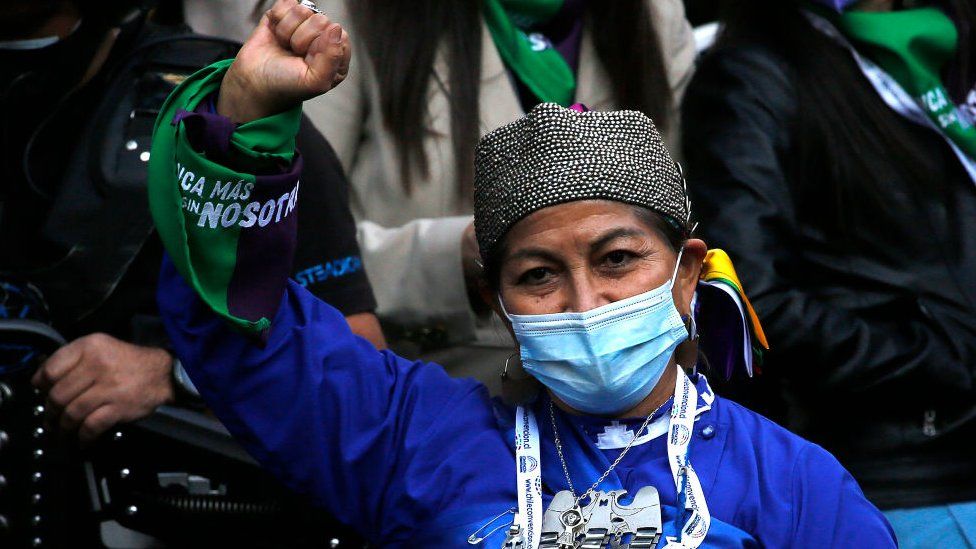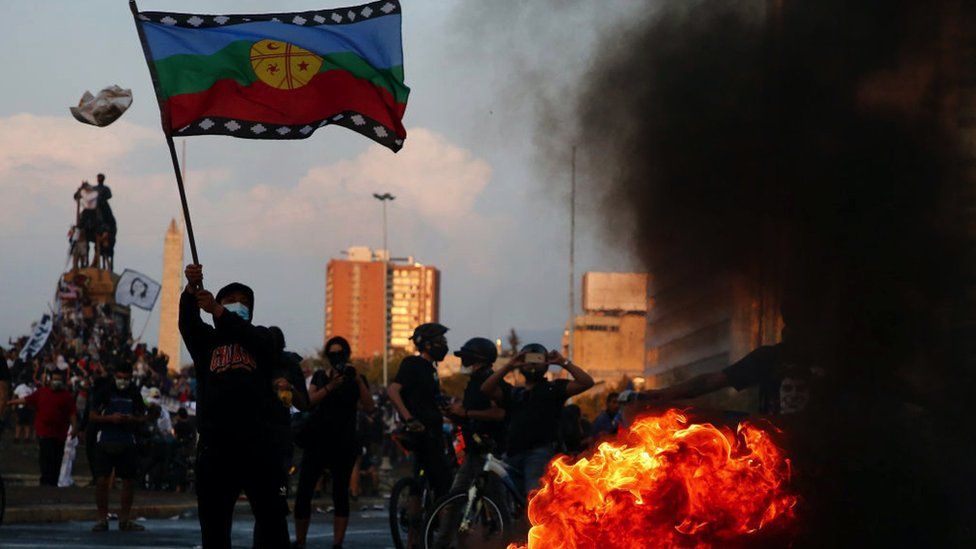By Eva Ontiveros
BBC World Service
Published1 day ago

Elisa Loncón is the first person to preside over Chile's newly created Constitutional Convention
In the 1970s, as Elisa Loncón was growing up, she had to travel 8km (five miles) to reach school. Her family, from Chile's Mapuche indigenous community, lived in poverty in a remote village in the southern Araucanía region. There was no-one to take her to classes, and very often, the only way to make the journey was on foot through dirt roads.
Her mother was a housemaid who loved poetry. Her father, a carpenter, had taught himself how to read at the age of 17. Life was difficult and, some days, her parents struggled to give Loncón and her six siblings food to eat. It was not easy at school either, because of the constant abuse she suffered over her indigenous roots.
But she did not give up.
"I come from a simple family. Like all Mapuche families we faced hardship," she said recently in an interview to Spanish newspaper El País. The Mapuche are Chile's largest indigenous ethnic group, with a common language, and a shared social, religious, and economic structure. But they have almost no guaranteed rights. "We stayed true to our values," she said, "inspired by collective norms, memory, history".
She eventually left the village called Lefweluan, where most of her relatives still live, and graduated as an English teacher. She went on to earn a PhD in humanities from the University of Leiden, in the Netherlands, and another PhD in literature from the Pontifical Catholic University of Chile, before becoming a full-time professor at the University of Santiago.
Alongside her impressive academic work, Loncón embarked on a fight to defend the Mapuche. She became a well-known activist and, earlier this year, was elected for one of the 17 seats reserved for representatives of native peoples in the Constitutional Convention, the body that will write a new constitution for a deeply divided Chile.

In the 1970s, as Elisa Loncón was growing up, she had to travel 8km (five miles) to reach school. Her family, from Chile's Mapuche indigenous community, lived in poverty in a remote village in the southern Araucanía region. There was no-one to take her to classes, and very often, the only way to make the journey was on foot through dirt roads.
Her mother was a housemaid who loved poetry. Her father, a carpenter, had taught himself how to read at the age of 17. Life was difficult and, some days, her parents struggled to give Loncón and her six siblings food to eat. It was not easy at school either, because of the constant abuse she suffered over her indigenous roots.
But she did not give up.
"I come from a simple family. Like all Mapuche families we faced hardship," she said recently in an interview to Spanish newspaper El País. The Mapuche are Chile's largest indigenous ethnic group, with a common language, and a shared social, religious, and economic structure. But they have almost no guaranteed rights. "We stayed true to our values," she said, "inspired by collective norms, memory, history".
She eventually left the village called Lefweluan, where most of her relatives still live, and graduated as an English teacher. She went on to earn a PhD in humanities from the University of Leiden, in the Netherlands, and another PhD in literature from the Pontifical Catholic University of Chile, before becoming a full-time professor at the University of Santiago.
Alongside her impressive academic work, Loncón embarked on a fight to defend the Mapuche. She became a well-known activist and, earlier this year, was elected for one of the 17 seats reserved for representatives of native peoples in the Constitutional Convention, the body that will write a new constitution for a deeply divided Chile.

"It's possible, brothers and sisters, to re-found this Chile," Dr Loncón said in her speech
It was a historic moment. Native communities have had little say in the running of the country to date, and Chile has never before defined itself as a multicultural nation. Indigenous people are not even mentioned in the current constitution, which dates back to the right-wing military dictatorship of Augusto Pinochet, who ruled between 1973 and 1990.
And this month, in a decision charged with symbolism, she was elected to preside over the 155-member convention which, for the first time, proposes the recognition of the country's native peoples.
With her fist clenched above her head, Loncón, who is 58, accepted the position, amid noisy celebrations. "I salute the people of Chile from the north to Patagonia, from the sea to the mountains, to the islands, all those who are watching us today," she said, holding up a Mapuche flag.
"I'm grateful for the support of the different coalitions that placed their trust and their dreams in the hands of the Mapuche nation, who voted for a Mapuche person, a woman, to change the history of this country."

Who are the Mapuche?
Before the Spanish arrived in the16th Century, the Mapuche inhabited a vast swathe of land in southern Chile
Renowned for their ferocity, they successfully resisted conquest until the late 19th Century, when they were rounded up into small communities
Much of their land was sold off to farmers and forestry companies
About 12% of Chileans define themselves as indigenous, most of them as Mapuche

The convention, which has parity between male and female members, a first in the world, is made up by a majority of independent and left-leaning names. This has raised hopes for profound reforms, replacing a constitution blamed for social inequalities that sparked deadly protests in 2019.
Among the demands of the Mapuche and the other nine native Chilean peoples is the creation of a plurinational state, within which their autonomy and rights are accepted, as well as the recognition of their cultures and languages. Loncón herself wrote a series of books teaching the official Mapuche language, the mapudungun.
The communities also want guarantees in territorial terms. Indigenous groups have ancestral claims to their lands, which often enter into conflict with those of current landowners. Any dramatic changes are likely to raise questions over property rights, or about the more complicated issue of reparations.
"It's possible to dialogue with us, you do not need to fear us," Loncón told Chilean newspaper La Tercera, ahead of the vote for the commission. "There is a lot of prejudice [against the Mapuche]. So, this is also a call to free ourselves from our prejudices and relate to each other on equal terms."

It was a historic moment. Native communities have had little say in the running of the country to date, and Chile has never before defined itself as a multicultural nation. Indigenous people are not even mentioned in the current constitution, which dates back to the right-wing military dictatorship of Augusto Pinochet, who ruled between 1973 and 1990.
And this month, in a decision charged with symbolism, she was elected to preside over the 155-member convention which, for the first time, proposes the recognition of the country's native peoples.
With her fist clenched above her head, Loncón, who is 58, accepted the position, amid noisy celebrations. "I salute the people of Chile from the north to Patagonia, from the sea to the mountains, to the islands, all those who are watching us today," she said, holding up a Mapuche flag.
"I'm grateful for the support of the different coalitions that placed their trust and their dreams in the hands of the Mapuche nation, who voted for a Mapuche person, a woman, to change the history of this country."

Who are the Mapuche?
Before the Spanish arrived in the16th Century, the Mapuche inhabited a vast swathe of land in southern Chile
Renowned for their ferocity, they successfully resisted conquest until the late 19th Century, when they were rounded up into small communities
Much of their land was sold off to farmers and forestry companies
About 12% of Chileans define themselves as indigenous, most of them as Mapuche

The convention, which has parity between male and female members, a first in the world, is made up by a majority of independent and left-leaning names. This has raised hopes for profound reforms, replacing a constitution blamed for social inequalities that sparked deadly protests in 2019.
Among the demands of the Mapuche and the other nine native Chilean peoples is the creation of a plurinational state, within which their autonomy and rights are accepted, as well as the recognition of their cultures and languages. Loncón herself wrote a series of books teaching the official Mapuche language, the mapudungun.
The communities also want guarantees in territorial terms. Indigenous groups have ancestral claims to their lands, which often enter into conflict with those of current landowners. Any dramatic changes are likely to raise questions over property rights, or about the more complicated issue of reparations.
"It's possible to dialogue with us, you do not need to fear us," Loncón told Chilean newspaper La Tercera, ahead of the vote for the commission. "There is a lot of prejudice [against the Mapuche]. So, this is also a call to free ourselves from our prejudices and relate to each other on equal terms."

There is often tension between Mapuche communities and the state
Loncón's election to preside over the body indicates the majority of the commission is keen on updating the country, but it is unlikely to be plain sailing. The opening session was delayed by almost an hour due to protests by a group of constituents, which followed clashes between police and demonstrators in the capital, Santiago .
The agreement among parties is that the presidency of the convention will rotate, although it has not yet been decided how long each term will last. The first draft of the new Chilean constitution is expected by 2022, and will be followed by another plebiscite, with mandatory voting.
"It's a dream of our ancestors and this dream has come true," Loncón said in her acceptance speech. "It's possible, brothers and sisters, to re-found this Chile, to establish a relationship between the Mapuche people... and all the nations that make up this country."
CONTEXT: We must be heard too, Chile indigenous say
VOICES: The pop sensation challenging repression
ON THE GROUND: The writing is on the wall
Loncón's election to preside over the body indicates the majority of the commission is keen on updating the country, but it is unlikely to be plain sailing. The opening session was delayed by almost an hour due to protests by a group of constituents, which followed clashes between police and demonstrators in the capital, Santiago .
The agreement among parties is that the presidency of the convention will rotate, although it has not yet been decided how long each term will last. The first draft of the new Chilean constitution is expected by 2022, and will be followed by another plebiscite, with mandatory voting.
"It's a dream of our ancestors and this dream has come true," Loncón said in her acceptance speech. "It's possible, brothers and sisters, to re-found this Chile, to establish a relationship between the Mapuche people... and all the nations that make up this country."
CONTEXT: We must be heard too, Chile indigenous say
VOICES: The pop sensation challenging repression
ON THE GROUND: The writing is on the wall
No comments:
Post a Comment